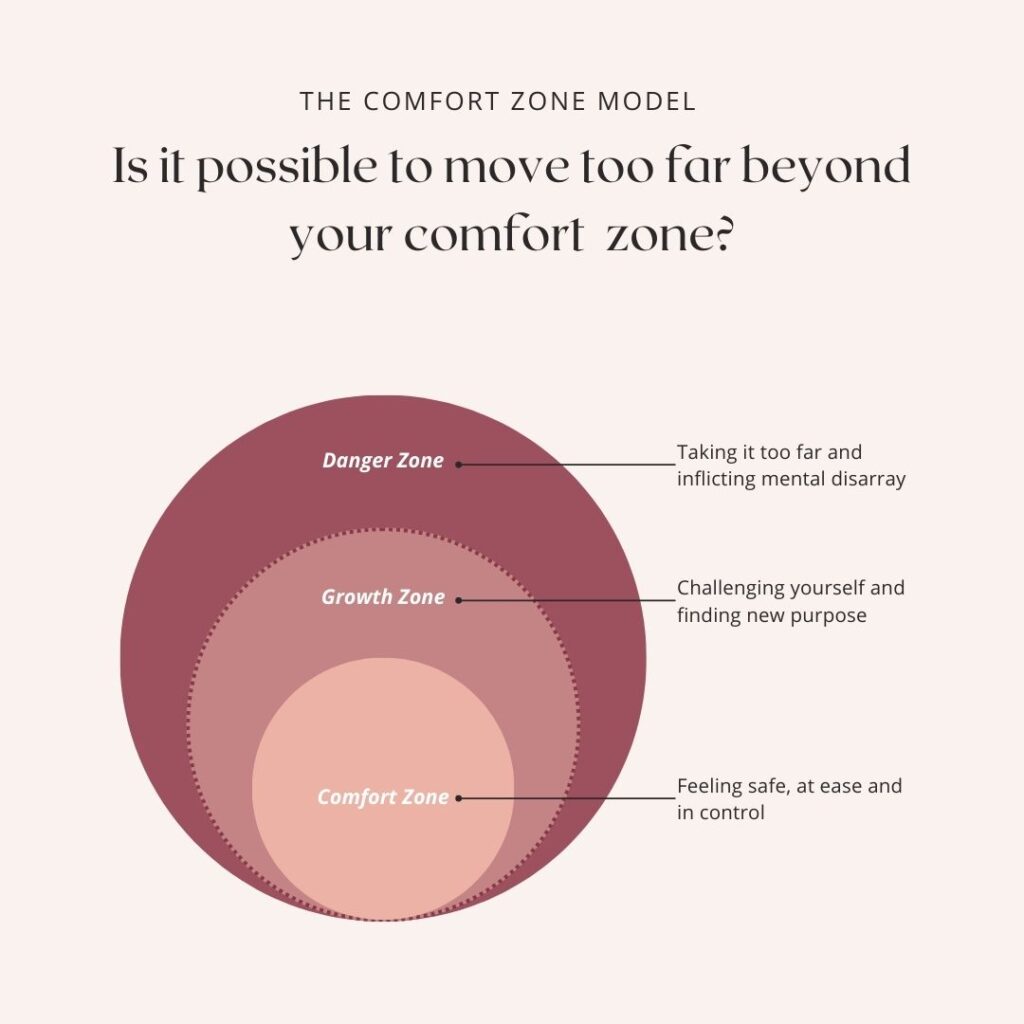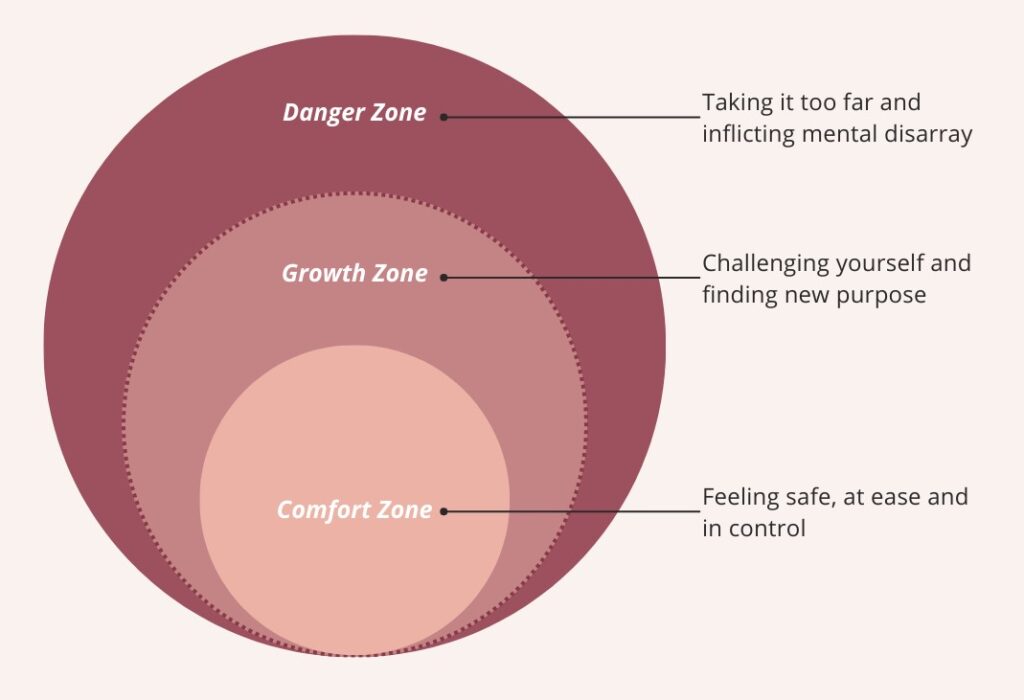
A trusted colleague once explained to me the importance of stepping outside of my comfort zone. She drew out some circles, explaining that to grow my comfort zone, I need to step outside of it. She set out three circles, one that represented my comfort zone, one that represented growth and one that represented chaos. The general idea was to encourage me to take steps outside of my comfort zone (which at this point in my career I was firmly positioned within!), by challenging myself to acquire new skills. The result of this would be that over time I’d grow my comfort zone to encompass my new capabilities.

She explained to me that there is an outer limit to growing your comfort zone. If it feels chaotic, you’ve probably gone too far. This is something that stuck with me, especially given my interest in mental health and wellbeing. Since that day I’ve strived to understand where the line can be drawn between growth and inflicting mental disarray. This includes how to stay within that sweet spot of growth.
I’ve since adapted this model, to align with my personal interpretation of my comfort zone. I know that I have a tendency to push myself too far, at the cost of my mental wellbeing. I’ve always felt an overwhelming fear when pushing myself outside of my comfort zone. I naturally have a low threshold for anxiety, feel like I’m losing control and quickly fall into mental disarray. For this reason, I have outlined three key ways of staying within that sweet spot ‘growth zone’. I’ve outlined how to stretch your comfort zone without hitting the dangerous territory that could implicate your mental wellbeing.

Slowly grow your comfort zone
If you’re ambitious by nature you will likely want to continuously push yourself outside of your comfort zone. In my experience, the best growth and development happens when you challenge yourself, stepping outside of things that feel easy.
With that in mind, it is crucial to be able to identify the things that feel ‘safe’. By safe, I mean things that you can action with little mental energy and time. If you delegated these tasks to another team member, you wouldn’t feel like you were missing an opportunity.
I would encourage you to do less of these ‘safe’ tasks (with the caveat that there will likely always be a need for you to carry out tasks like this at times!). The tasks that will help you to grow your comfort zone are the ones that feel ‘scary’. These are likely things you haven’t done before, using skills you haven’t fully developed yet. You may need careful planning to implement key actions and use guidance from someone more experienced in that particular task. This is where growth is seen, skills are levelled up and you gain the ability to carry out trickier tasks.
However, if the ‘scary’ tasks start to feel ‘overwhelming’, this is probably because you are coming towards your danger zone. Your mental health is crucial, if your rate of growth starts to cause you extreme anxiety or is weighing down on your life, then it is probably too much. Every individual has a different tolerability when it comes to hitting the ‘danger zone’. Some people are able to push themselves to extreme levels, without hitting an ‘overwhelming’ level of mental burden. Others may hit the ‘danger zone’ earlier and therefore may benefit from a slower and more steady approach.
The key point here is that it is important to keep tabs on your growth journey and adapt to the rate of growth you can personally endure before feeling mental disarray. Everyone has the innate ability to grow and can strive to do so, but real success comes from the ability to moderate the rate of your progression based on what is manageable for you.
Celebrate every win
Don’t forget to celebrate the wins, however big or small. Every time you step outside of your comfort zone, you are taking a step towards self-improvement and growth. Every new experience you gain and skill you develop is worth celebrating. Take the time to track your progress and reward yourself for the advancements you are making.
Re-align yourself when approaching the ‘danger zone’
You might ask, what happens if I hit the ‘danger zone’? This is something that will probably happen, in fact you’ve probably already experienced a situation where you felt out of your depth or overwhelmed. With growth comes failure and with failure comes learnings. There will likely be times when you end up pushing yourself too much and find yourself unable to action certain tasks. This can lead to disappointment when you need someone to take the reins and help you resolve an issue.
It is important when these situations arise to remind yourself of the big picture. Take perspective of your journey, remind yourself how far you’ve come and use the disappointment learn more about yourself. These challenges will allow you to understand the limits of your abilities and identify where you may need to grow some new skills.
Don’t lie in the ‘danger zone’ feeling horrendous and perpetuating negative thoughts. Instead, try and think about the reality of the situation. Once an initial solution has been put into place, oftentimes we work up the situation to be bigger than it is. This is the moment where it is vital to take a step back, re-align yourself with your guiding goals and appreciate your ability to be resilient.
Remember, self-improvement is a huge undertaking, but with the right mindset you will be able to overcome disappointments, challenge yourself and progress towards your ultimate goals!
DISCLAIMER: The author of this blog is not a medical professional, this article is purely based on personal experiences and should be used for informational purposes only. This article is not intended to be used as a substitute for medical advice from a trained healthcare professional. Please speak to a medical professional with any specific concerns about your mental health.

This visual is so useful!
Thanks!! So glad 🙂